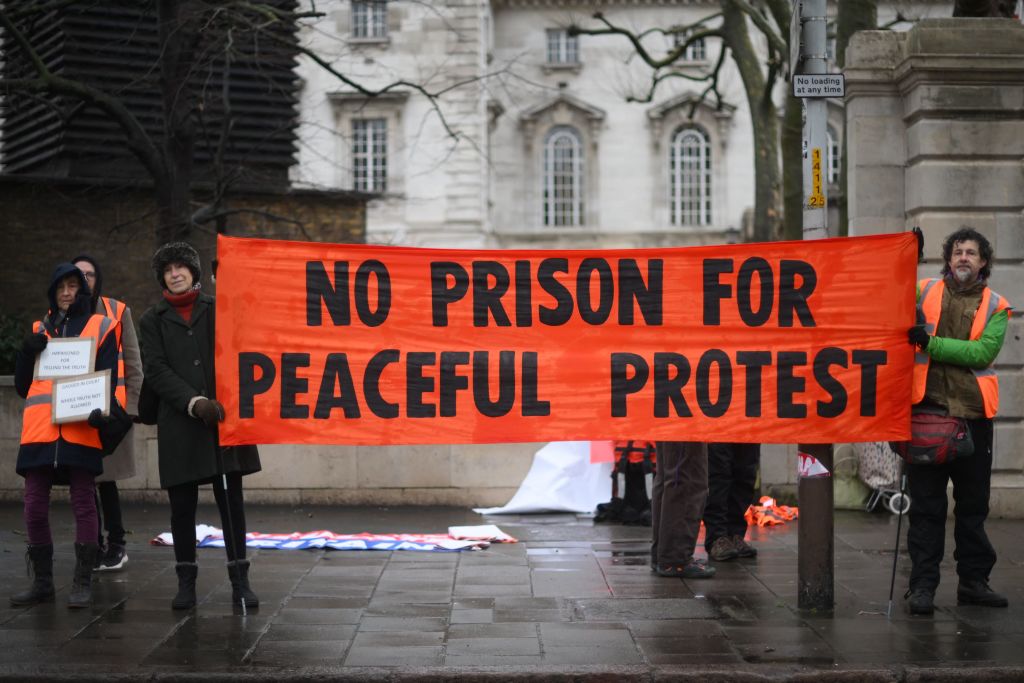A group of 120 ‘top lawyers’ have signed a ‘declaration of conscience‘ stating they will not prosecute ‘peaceful climate change protestors’ and will ‘withhold [their] services in respect of supporting new fossil fuel projects.’
Predictably the tax specialist and founder of the ‘Good Law Project’ Jolyon Maugham KC is amongst the signatories, although the practical effect of his conscientious objection is limited. I’m pretty sure he has never prosecuted a criminal case in his entire career, and it would be remarkable if the CPS now decided to instruct him to prosecute a climate change protestor. The same can be said, it appears, for the vast majority of the signatories, who also include Tim Crosland, director of the environmental pressure group Plan B who was recently disbarred for deliberately breaching a publication embargo on a Supreme Court judgment. Another is Sir Geoffrey Bindman KC, a distinguished human rights solicitor and certainly someone who knows his way around a criminal court, but who at the age of 90 is unlikely to complete the soul-destroying process of joining the list of CPS approved counsel, on the off chance that he might then be sent a brief to prosecute a climate change activist which he could dramatically refuse to accept.
The self-righteous signatories of the declaration consider that this principle – the cab-rank rule – should not apply to them
The effect of the declaration to withhold legal advice to companies seeking to develop new fossil fuel projects is also likely to be non-existent. I suppose it is just about conceivable that an Esso in-house solicitor might take leave of his senses and seek Mr Maugham’s assistance in devising a tax avoidance scheme, but it would be the height of corporate folly and it is not going to happen.
Yet despite not having any practical effect, the declaration does raise an important point of principle. By indicating that they will refuse instructions on what amounts to political grounds the barrister signatories – somewhat different considerations apply to the solicitors – are directly challenging one of the core principles governing the profession. In areas of law in which they have expertise barristers are required to accept instructions to represent any client, irrespective of ‘the nature of the case to which the instructions relate’ and ‘any belief or opinion which [the barrister] may have formed as to the character, reputation, cause, conduct, guilt or innocence of the client.’
The self-righteous signatories of the declaration consider that this principle – the cab-rank rule – should not apply to them. In their view barristers should pick and choose their clients on the basis that they approve or disapprove of them.
Of course it matters little that Jolyon Maugham will not be prosecuting climate change protestors or advising the oil industry, but if the principle that barristers should discriminate between clients on the basis of their political beliefs were to become accepted it would matter a great deal. People would then say ‘that barrister must agree with that client, otherwise they wouldn’t agree to represent them.’ Unpopular clients will struggle to find representation, barristers who choose to represent them will themselves risk becoming pariahs. If climate activists can publicly refuse to represent oil companies, it is easy to imagine others refusing to represent those accused, say, of child abuse or domestic violence. Indeed there may be some that already do.
So it is time the Bar put a stop to this nonsense before it gets out of hand. To his credit the Chairman of the Bar Council, Nicholas Vineall KC – who lists on his chambers website that he has ‘acted for rig owners on a threatened North Sea drill contract cancellation’ (he didn’t say whether he won, but I hope he did) – did his best to stand up for the cab-rank rule in an address at the Temple Church last week. ‘It is,’ said Vineall, ‘for judges or juries to decide who is right and who is wrong, not barristers.’ It is an absolutely fundamental point underpinning the rule of law.
Amongst the congregation, and recording Vineall on his mobile phone, was another of the barrister signatories to the ‘declaration of conscience,’ Paul Powlesland. Mr Powlesland, who has a taste for twitter stunts, held up a placard inside the church reading ‘How Many Deaths Does ‘Cab Rank’ Justify?’ After the service he harangued the Master of the Temple, demanding to know:
‘What is the official Christian position? Should I as a barrister be forced to act for fossil fuel companies whose actions will lead to the deaths of millions of people in the global south, yes or no?’
Needless to say, there is no ‘official Christian position’ on the cab rank rule; there is not the slightest prospect that Mr Powlesland will be ‘forced’ to act for fossil fuel companies; and the assertion that their actions will ‘lead to the deaths of millions of people in the global south’ is at best highly tendentious and quite possibly the complete opposite of the truth. It is impossible, to take just one example, to see how, without the use of natural gas, the world could possibly feed its current population, until someone invents a practical new way to manufacture nitrogen fertiliser. Without such fertilisers billions could starve. Such dangers, such complexities and such moral dilemmas are simply ignored by those in the grip of this environmentalist cult. It is no surprise that in their pursuit of moral purity these misguided lawyers seem to consider the rule of law as just another impediment on the path to their Utopia.






Comments